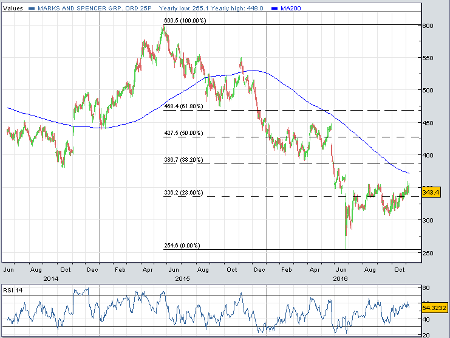Massive change at struggling M&S
8th November 2016 13:15
by Harriet Mann from interactive investor
Share on
Just six months into his new job as boss of high-street staple , and Steve Rowe is axing wholly-owned international stores in 10 countries to focus on fattening up the UK food business.
That makes sense. Yes, clothing sales fell less than expected, but group profit collapsed by 88% in the six months ended 1 October. A strong Christmas would help, but Rowe must make big changes if Marks is to dominate the high street again.
While former chief Marc Bolland had his eyes set firmly on building M&S into an international retail powerhouse, Rowe has decided he was wrong. He'll close loss-making stores across 10 foreign markets, leaving mostly franchises overseas. A five-year plan in the UK will cut clothing and home space by 10% as 30 stores close and others shift to the more successful Simply Food chain.
At least Rowe is trying. One of his first actions as boss was to slice the top tier of management and axe head-office jobs. While a move away from sales and promotions toward permanently lower prices has weighed on sales growth, Rowe is confident customers will return.
"These are tough decisions, but vital to building a future M&S that is simpler, more relevant, multi-channel and focused on delivering sustainable returns," argues the boss.

Unrelenting weakness in Clothing & Home weighed on underlying profits, which slumped 19% to £231 million in the 26 weeks to 1 October, giving earnings per share of 11.5p. Include a £154 million charge for changes to pay and pensions, and £22.7 million provision for insurance product mis-selling, and pre-tax profit collapsed from £216 million to £25.1 million.
Group revenue was flat on the year, as a 4% jump in food sales was offset by a 5.3% slump in Clothing & Homes. At least plummeting like-for-like sales at the struggling clothing division did slow in the second quarter to 2.9% from 8.9% in the first three months. That's also better than the 3-4% drop pencilled in by analysts.
It's disappointing that the group suffered a 20 basis point decline in clothing value share according to the Kantar World Panel, but not surprising. Still, reduced promotions drove a 10 basis point increase in the gross margin to 56.7%, despite increased currency headwinds and greater levels of sales stock due to challenging market conditions. Further sterling weakness is likely to weigh on full-year growth, with the forecast cut from 50-100 basis points to 0-50 basis points.
Food continues to outperform as it grows market share, with 21 new stores already beating expectations. However, even here a 0.9% drop in second-quarter like-for-like sales was slightly below consensus estimates of flat revenue. Gross margin rose 10 basis points to 32.6%.
Online sales growth and the UK's performance was uninspiring, up 0.3% and 0.1% respectively, although the UK business slipped 3% like-for-like. International turnover fell 1%. Across the group, sales were flat.
Change is expensive
Of course, Rowe's strategy comes at a cost. Closing underperforming international stores will cost £150-£200 million over the next 12 months and the repositioning of its Clothing & Home space mix around £150 million over three years. Against uncertain market conditions, this is a costly, but crucial, project and capex is likely to reach £400 million this year.
That's why management has decided against returning additional cash to shareholders in the second half, maintaining its interim payout at 6.8p. Strategy costs mean no special dividend this time, although the prospective yield is still over 5%.
"We believe that investors will regard these M&S results and the accompanying strategic commentary as slightly positive, because the results were not quite as bad as anticipated and the changes to guidance have been relatively immaterial in our view," says Haitong Research analyst Tony Shiret.
"We now believe that M&S as a minimum needs not to mess up this Christmas and to achieve the market consensus estimates as a base upon which to restructure and persuade the market that it is not becoming Debenhams."
Reflecting scepticism about Rowe's ability to turn Marks around, and amid ongoing concerns about weak sales of women's clothing, M&S shares fell over 3% Tuesday. Eighteen months ago they were worth almost twice as much, although Shiret reckons there could be 9% upside to 375p.
While M&S shares have regained some momentum since the last sell-off in September, we are in the very early stages of any potential recovery in both operations and the share price.
This article is for information and discussion purposes only and does not form a recommendation to invest or otherwise. The value of an investment may fall. The investments referred to in this article may not be suitable for all investors, and if in doubt, an investor should seek advice from a qualified investment adviser.